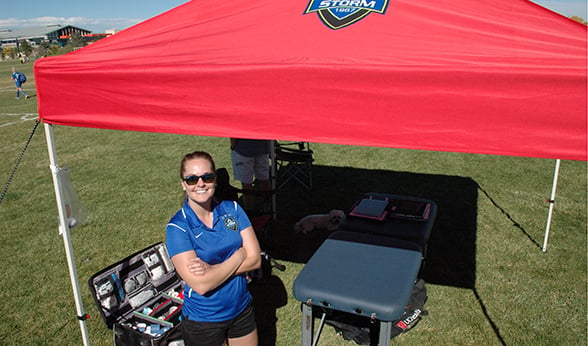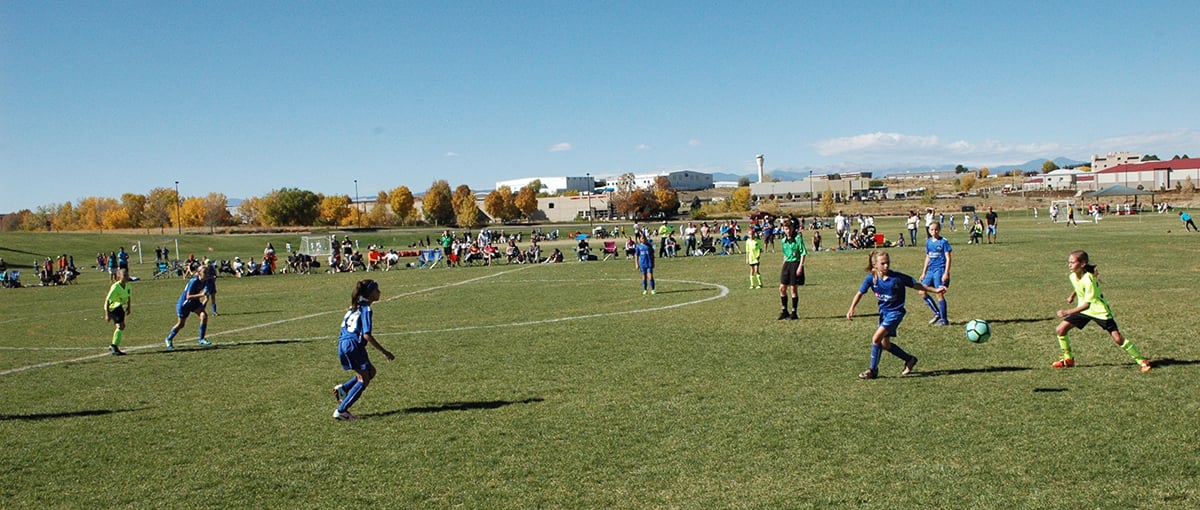As injuries in youth soccer grow in numbers and severity, medical personnel are now essential staff for competitive leagues and sports complexes.
A recent national study shows that for every 10,000 youth soccer players in 2014, 223 of them sustained an injury requiring hospital emergency room treatment. That’s a 74 percent increase from 2004, according to the study, which uses data from the National Electronic Injury Surveillance System and the National Sporting Goods Association. Higher levels of youth competition, and corresponding intensity, are part of the reason – along with exponential growth in participation – for the rise in soccer injuries.
 Julie Nickoley came aboard as the Storm's first head athletic trainer last April.
Julie Nickoley came aboard as the Storm's first head athletic trainer last April.
These increases are why the Colorado Storm Soccer Association (CSSA), one of the state’s oldest and largest youth soccer clubs, is teaming up with University of Colorado Sports Medicine specialists and UCHealth to provide on-field and off-field care for its athletes. This partnership gives young athletes access to leading sports medicine physicians with the experience and expertise in treating sports-related injuries. CU Sports Medicine specialists primarily provide care for athletes at UCHealth and Children’s Hospital Colorado facilities.
On-call for athletes, parents
In addition to providing physician care, CU Sports Medicine has hired Julie Nickoley, MA, ATC, as the full-time head athletic trainer at Colorado Storm to staff all home activities and travel with teams. While the job is immense – Colorado Storm encompasses 7,000 athletes, both competitive and recreation, playing in four regions along the Front Range – Nickoley provides care during practices, games and is on-call for athletes and parents.
When staffing home games, Nickoley is responsible for all players on the field, including athletes from visiting clubs. “For large tournaments, we can have 50 games in one day and I’m tasked with care for all players,” she explains. “Sometimes, we bring in trainers to help with volume because it’s extremely uncommon for a team to travel with an athletic trainer.” That, however, is not the case for Colorado Storm. So far, Nickoley has traveled twice with the Elite Club National League (ECNL) 14- to 18-year-old girls’ team, both times to San Diego.
A traveling athletic trainer is invaluable to the athletes, according to Caitlin McPherson, Colorado Storm goalkeeper. “Having a trainer who knows you personally, who knows the injury you’ve dealt with in the past or how to tape your ankle just right, is much more comforting than having someone you’ve never met doing the tape.”
‘There’s someone there’
Nickoley has treated a variety of injuries on the field including dislocated kneecaps, labral hip tears and sprained ankles. However, treatment doesn’t stop on the field. Nickoley further develops the home rehab plan, recommending exercises and stretches, and follows up on the player’s progress. Nickoley has also established an athletic training evaluation space inside the Colorado Storm headquarters available to athletes and parents. Having a dedicated space gives her the ability to see injuries within 48 hours, as well as provide treatment or taping before practice.
 The soccer fields at Dove Valley Regional Park fill up with Storm matches every weekend in the fall.
The soccer fields at Dove Valley Regional Park fill up with Storm matches every weekend in the fall.
For athletes, the presence of an athletic trainer takes away the worry of injury. “It’s comforting to know if anything happens, there’s someone there, who knows what to look for, checking the player out,” says Caitlin. “Best case, the player gets checked and is cleared to return to play.”
In the event of a more serious injury, Nickoley’s close working relationship with CU Sports Medicine specialists has afforded her the ability to refer athletes and their parents to the most appropriate specialist depending on location, severity, or type of injury. She is currently working on an initiative to ensure Colorado Storm athletes have priority when the injury requires an X-ray, MRI or other procedure. This is the same approach CU Sports Medicine takes with collegiate level teams and the professional teams they support.
Concussion protocol
When she sees more serious concussions, Nickoley refers players to the CU Sports Medicine specialists at Children’s Hospital Colorado, which has a comprehensive concussion program. Nickoley has seen about 25 concussions in the last six months. She takes the injury very seriously, running through a 22-symptom list of concussion-related symptoms with players. “I take the more conservative route – if you have two of those symptoms, it’s a concussion,” she says. In the case of a mild concussion, she tells the player, “You’re done for the day, and we’re going to wait 24 hours and then re-evaluate to see where you’re at.”
Soccer organizations are also addressing the problem through greater use of athletic trainers, such as Nickoley, as well as through rule changes. U.S. Soccer, the sport’s governing body, has told youth organizations that there should be no heading of the ball for players age 10 and under, while limiting the amount of heading during practice for ages 11 to 13.
Another benefit of having a full-time athletic trainer embedded in Colorado Storm is education on injury prevention techniques. Nickoley is working with coaches on a few specialized exercises that help decrease risks of anterior cruciate ligament (ACL) injury in girls, who are anatomically more predisposed to these injuries. She also consults with the coaches on nutrition, hydration, recovery, flexibility, and proper warm-up and cool-down so that athletes are conditioned for the high level of play.
Nickoley is only six months into the five-year partnership between CU Sports Medicine and Colorado Storm but well on her way to building a comprehensive care program for the young athletes. “There’s still work to be done. Ideally, we want to have programming for all regions of Colorado Storm,” she says. Right now, she’ll continue to focus her efforts on current players and game-day activities. Exceptional care, at all times, is what CU Sports Medicine specialists offer their Colorado Storm athletes.
